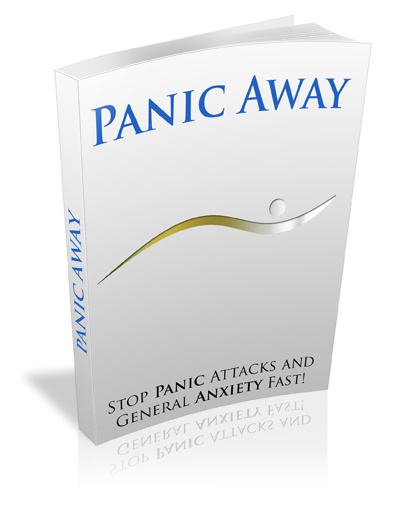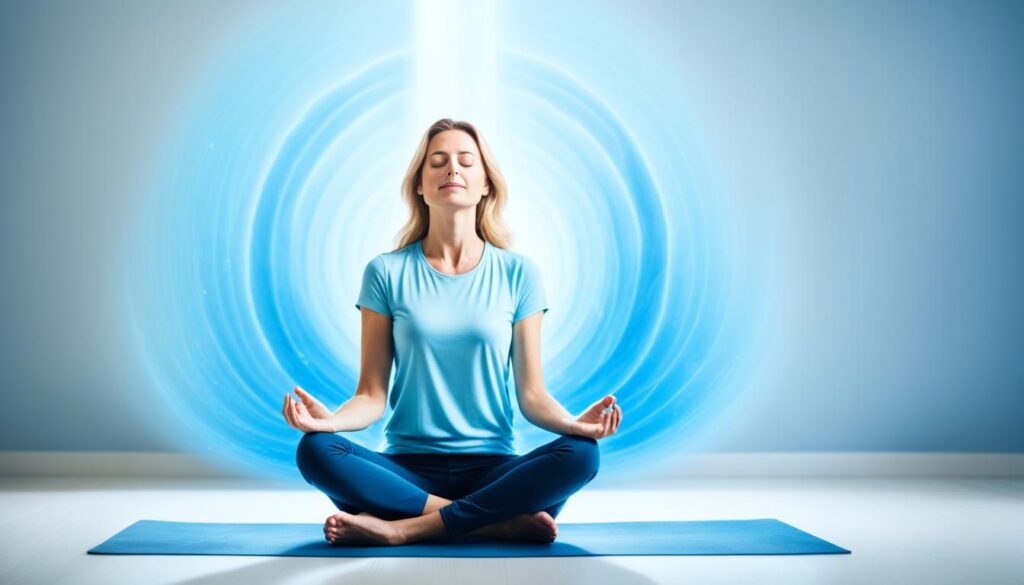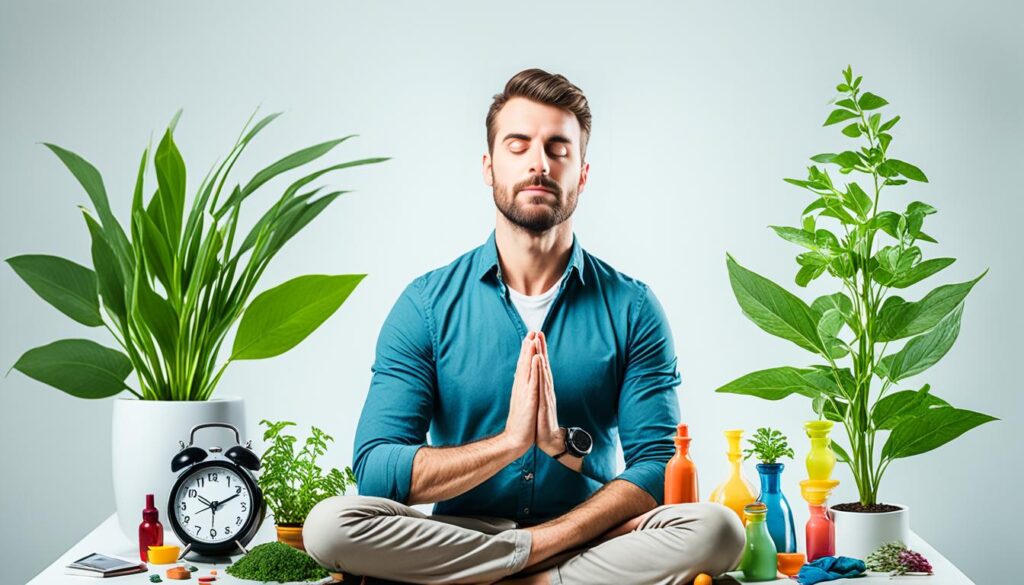Have you ever felt like anxiety was consuming your every thought and controlling your life? I know I have. The constant worries, racing heartbeat, and overwhelming sense of unease can be paralyzing, making it difficult to fully enjoy the present moment. But I want you to know that you're not alone. Anxiety is a common struggle that many of us face, and there is hope for finding relief.
When I first started my journey to manage my anxiety, I stumbled upon mindfulness meditation. At first, I was skeptical. How could simply being present and aware make a difference in my mental health? But let me tell you, it has been a game-changer. Mindfulness meditation has allowed me to find peace and calm in the midst of my anxious thoughts. It has given me a sense of control and empowered me to navigate through the challenges of anxiety.
Our Top Pick For Beating Panic Attacks

Stopping, and preventing, panic attacks is now even easier.
Mindfulness meditation is more than just a temporary fix. It's a lifelong practice that has the power to transform your relationship with anxiety. By cultivating a non-judgmental awareness of your thoughts and emotions, you can learn to navigate them with kindness and compassion. Mindfulness meditation teaches you to be fully present in the moment, rather than getting caught up in the worries of the past or future.
In this step-by-step guide, we will explore the power of mindfulness meditation for anxiety relief. We will dive into various mindfulness practices, meditation techniques, and self-care strategies that can help you reduce stress, find inner peace, and reclaim control over your mental health. Whether you're a beginner or have some experience with mindfulness, there's something here for everyone.
Key Takeaways:
- Mindfulness meditation can provide relief from anxiety and promote mental well-being.
- By being fully present and aware, you can gain insight into the underlying causes of your stress and prevent worries from consuming your thoughts.
- Mindfulness-Based Stress Reduction (MBSR) is an effective program for anxiety reduction.
- Mindfulness-Based Cognitive Therapy (MBCT) combines mindfulness practices with inquiry and reflection to help individuals with anxiety and depression.
- Consistency in your meditation practice is key to experiencing its full benefits.
The Benefits of Mindfulness for Anxiety Relief
Mindfulness meditation is a powerful practice that offers numerous benefits for anxiety relief and overall mental well-being. By incorporating mindfulness into your daily routine, you can reduce stress, increase self-awareness, and gain valuable insights into the underlying causes of anxiety. Mindfulness allows you to fully experience the present moment without judgment, helping you let go of worries and prevent them from consuming your thoughts.
Research has shown that practicing mindfulness meditation can lead to significant reductions in anxiety and stress levels. By cultivating a sense of presence and awareness, you become better equipped to manage your anxious thoughts and respond to them in a more balanced way. The regular practice of mindfulness can also help regulate your emotions, enhance your focus, and improve your overall mental resilience.
One of the key benefits of mindfulness meditation is its ability to create space around your worries. Instead of being overwhelmed by anxious thoughts, mindfulness allows you to observe them without getting entangled in their grip. This process of detached observation can help you gain clarity and perspective, allowing you to respond to anxiety in a more effective and compassionate manner.
“Mindfulness is the ultimate tool for managing anxiety. It teaches you to be present, to observe your thoughts and emotions, and to cultivate a compassionate attitude towards yourself. It has truly been transformative for my own anxiety management journey.” – Sarah Thompson, Mindfulness Practitioner
Another benefit of mindfulness for anxiety relief is its impact on the body's stress response. By practicing mindfulness meditation, you can activate the body's relaxation response, which counteracts the physiological effects of stress. This can lead to a decrease in heart rate, blood pressure, and muscle tension, promoting a state of deep relaxation that can be highly beneficial for anxiety management.
Incorporating mindfulness into your daily life can have a profound impact on your mental well-being. As you develop a consistent mindfulness practice, you become more attuned to your thoughts and emotions, allowing you to respond to stressful situations with greater clarity and calmness. This increased mental resilience can help you navigate anxiety-inducing situations more effectively and maintain a sense of equilibrium in the face of daily challenges.
The Benefits of Mindfulness Meditation for Anxiety Relief:
- Reduces anxiety and stress levels
- Enhances self-awareness and introspection
- Promotes emotional regulation and resilience
- Activates the body's relaxation response
- Creates space around anxious thoughts
- Improves focus and concentration
By embracing mindfulness meditation as a regular practice, you can experience the transformative power it holds for anxiety relief and overall mental well-being.
Understanding Mindfulness-Based Stress Reduction (MBSR)
Mindfulness-Based Stress Reduction (MBSR) is an 8-week program developed by Jon Kabat-Zinn that combines teachings, mindfulness practices, and movement practices to help individuals work with the stresses of everyday life. MBSR has been found to effectively reduce symptoms of anxiety and panic, even in those with generalized anxiety disorder or panic disorder. The practice of MBSR allows individuals to bring awareness and acknowledgment to their stressed or anxious feelings and simply allow them to be, without judgment.
Mindfulness-Based Stress Reduction (MBSR) is a structured program that combines mindfulness practices and movement practices to reduce anxiety and promote stress management.
MBSR is often recommended as a complementary therapy for individuals struggling with anxiety disorders or panic disorder. By engaging in MBSR, individuals learn to cultivate a sense of mindfulness and non-attachment, which helps them navigate their anxious thoughts and emotions in a more balanced way.
Teachings and Mindfulness Practices in MBSR
The teachings and mindfulness practices in MBSR focus on cultivating awareness and acceptance of the present moment. Participants are guided through a variety of mindfulness techniques, such as meditation, body scans, and gentle yoga exercises. These practices help individuals develop a deeper understanding of their thoughts, emotions, and bodily sensations, allowing them to observe them without judgment.
“MBSR teaches individuals to bring mindful attention to their thoughts, emotions, and bodily sensations, fostering a sense of acceptance and non-reactivity.”
Through regular practice, participants of MBSR learn to identify their “automatic pilot” responses and develop the ability to respond to stressors in a more conscious and intentional way. This heightened self-awareness enables individuals to recognize their triggers and implement effective stress management techniques.
The Benefits of MBSR for Anxiety Reduction
The practice of MBSR can significantly reduce anxiety symptoms and provide individuals with a sense of empowerment and control over their emotions. Research has shown that MBSR interventions can lead to improvements in generalized anxiety disorder, panic disorder, and stress-related conditions. Studies have demonstrated reductions in anxiety levels, decreased rumination, and enhanced overall well-being in individuals who have participated in MBSR programs.
MBSR can be particularly helpful for those struggling with anxiety or panic disorder as it provides practical tools and techniques for managing anxiety symptoms. By bringing awareness to anxious thoughts and emotions without judgment, individuals can experience a sense of calm and resilience in the face of stressors.
Incorporating MBSR into daily life can also have long-term benefits for individuals experiencing chronic stress or anxiety. By cultivating a regular mindfulness practice, individuals can develop a strong foundation of self-care and stress management, leading to a more balanced and fulfilling life.

Mindfulness-Based Cognitive Therapy (MBCT) for Anxiety and Depression
Mindfulness-Based Cognitive Therapy (MBCT) is an 8-week program that combines mindfulness practices with inquiry and reflection to help individuals dealing with depression or anxiety. Based on the principles of Mindfulness-Based Stress Reduction (MBSR), MBCT specifically aims to prevent depressive relapse and reduce anxiety symptoms.
Through the combination of mindfulness and cognitive therapy techniques, MBCT helps individuals recognize and change negative thought patterns associated with depression and anxiety. By becoming more aware of their thoughts and emotions, individuals can develop greater insight and control over their mental processes, leading to improved emotional well-being.
“MBCT combines mindfulness practices with inquiry and reflection to help individuals recognize and change negative thought patterns associated with depression and anxiety.”
Research has shown that MBCT can be an effective intervention for mood and anxiety disorders. It has been found to significantly reduce symptoms of anxiety and depression, both in individuals with a history of recurrent depression and in those with generalized anxiety disorder. MBCT equips individuals with the necessary tools to better respond to challenging thoughts and emotions, ultimately enhancing their overall mental health and resilience.
Key Features of MBCT
MBCT incorporates several key features that make it an effective therapy for anxiety and depression:
- Integration of mindfulness practices: MBCT integrates various mindfulness practices, such as body scans, sitting meditation, and mindful movement, to cultivate present-moment awareness and acceptance.
- Cognitive restructuring: The cognitive therapy component of MBCT helps individuals recognize and challenge negative thought patterns and beliefs that contribute to anxiety and depression.
- Inquiry and reflection: MBCT incorporates inquiry and reflection exercises to deepen self-awareness and promote a non-judgmental exploration of one's experiences and thought patterns.
- Group support: MBCT is usually conducted in a group setting, providing individuals with a supportive environment where they can share their experiences and receive feedback from others.
“MBCT incorporates several key features, including mindfulness practices, cognitive restructuring, inquiry and reflection, and group support.”
The combination of these features allows individuals to develop mindfulness skills, gain insight into their cognitive processes, and build resilience, ultimately leading to a reduction in anxiety and depressive symptoms.
MBCT offers a structured and evidence-based approach for individuals seeking to manage their anxiety and depression using mindfulness practices. By participating in this program, individuals can develop the skills necessary to navigate their thoughts and emotions, fostering greater well-being and improved mental health.
Meditation Techniques for Anxiety Relief
When it comes to finding relief from anxiety, meditation techniques can be incredibly effective. These techniques help calm the mind, reduce stress, and promote a sense of peace and well-being. By incorporating meditation into your daily routine, you can cultivate a greater sense of mindfulness and ease. Here are some powerful meditation techniques that can help you find relief from anxiety:
- Focused Breathing: One of the simplest yet most powerful meditation techniques for anxiety relief is focused breathing. Find a comfortable position and bring your attention to your breath. Notice the sensation of the breath entering and leaving your body. Allow your breath to become calm and steady, and let go of any distracting thoughts or worries. This technique helps you anchor your attention in the present moment and can bring a sense of calm and relaxation.
- Body Scan: The body scan technique involves systematically bringing your attention to different parts of your body, starting from the top of your head and slowly moving down to your toes. Notice any sensations or tension in each area and gently release any areas of tightness or discomfort. This technique helps you cultivate a greater awareness of your body and can release physical tension that often accompanies anxiety.
- Open Awareness: Open awareness meditation involves expanding your attention to include the thoughts, emotions, and sensations that arise in the present moment. Instead of trying to control or push away these experiences, you observe them with curiosity and non-judgment. This technique fosters a sense of acceptance and allows you to develop a more compassionate relationship with your anxiety.
Research has shown that mindfulness meditation, including these techniques, can significantly reduce ruminative thought patterns and increase focus, leading to a decrease in anxiety symptoms. It's important to start with shorter meditation sessions, such as five to ten minutes, and gradually increase the time as you become more familiar with the practice. Consistency is key, so try to set aside a dedicated time each day for your meditation practice.
Remember, meditation is a skill that takes time and practice to develop. Be patient with yourself and approach the practice with an open mind and heart. With regular meditation practice, you can cultivate a greater sense of calm, reduce anxiety, and experience greater peace and well-being in your daily life.

Tips for Starting a Meditation Practice
Starting a meditation practice can be challenging, but with consistency, it can lead to a decrease in anxiety symptoms. Here are some tips to help you get started:
1. Find a Quiet and Comfortable Space
Choose a quiet and peaceful environment where you feel comfortable. It could be a designated meditation corner in your home or a serene spot in nature. Having a dedicated space can create a sense of tranquility and help you focus.
2. Start with Shorter Sessions
Begin with shorter meditation sessions of just a few minutes. This allows you to gradually build up your practice without feeling overwhelmed. As you become more comfortable, you can gradually increase the duration of your sessions.
3. Focus on the Breath
During meditation, one effective technique is to focus on your breath. Simply observe the natural rhythm of your breath without trying to control it. This can help anchor your attention and bring awareness to the present moment.
4. Observe Anxious Thoughts without Judgment
It is common to have anxious thoughts arise during meditation. Rather than suppressing or getting caught up in these thoughts, observe them without judgment. Recognize that they are just passing mental phenomena and gently guide your attention back to your breath or chosen anchor.
5. Use Guided Meditations or Apps
If you're new to meditation, consider using guided meditation recordings or smartphone apps. These resources provide step-by-step instructions and can help you stay focused. Some popular mindfulness meditation apps include Headspace, Calm, and Insight Timer.
| Tips for Starting a Meditation Practice: |
|---|
| – Find a quiet and comfortable space |
| – Start with shorter sessions |
| – Focus on the breath |
| – Observe anxious thoughts without judgment |
| – Use guided meditations or apps |
Remember, the key to a successful meditation practice is consistency. Even a few minutes of meditation each day can make a significant difference in reducing anxiety and promoting a sense of calm and well-being.
The Power of Mindfulness Meditation Apps
Mindfulness meditation apps have become a powerful tool for individuals seeking anxiety support and stress management. With the rise of technology, these apps offer convenient access to guided meditations, breathing exercises, and various meditation techniques. Whether you are new to mindfulness or an experienced practitioner, these apps can provide valuable resources to enhance your meditation practice and improve your overall well-being.
These mindfulness meditation apps offer a wide range of features and benefits. For starters, they provide a convenient and accessible platform to practice meditation anytime, anywhere. Whether you prefer to meditate in the comfort of your home or need a moment of relaxation during a busy day, these apps make it easy to incorporate mindfulness into your daily routine.
Guided Meditations and Breathing Exercises
One of the standout features of mindfulness meditation apps is the availability of guided meditations. These guided sessions are led by experienced instructors who provide step-by-step instructions, making it easier for beginners to develop their meditation practice. Guided meditations can be tailored to target specific needs, such as anxiety relief or stress reduction, allowing users to find a session that resonates with their current state of mind.
Breathing exercises are another popular feature offered by these apps. Deep breathing has been shown to activate the body's relaxation response and help reduce stress and anxiety. These apps provide a variety of breathing exercises that can be easily incorporated into your daily routine, helping you achieve a sense of calm and balance.
Stress Reduction and Anxiety Support
The mindfulness meditation apps also offer valuable resources to support individuals dealing with stress and anxiety. These apps often provide techniques and practices specifically designed to help manage anxiety and promote overall mental well-being. Users can access tools such as body scans, progressive muscle relaxation, and mindfulness techniques to address their anxiety symptoms effectively.
Moreover, some apps offer features such as mood trackers, gratitude journals, and reminders to help users maintain a consistent meditation practice and cultivate a positive mindset. These additional features enhance the overall experience, making the apps a comprehensive tool for stress management and anxiety support.
| Benefits of Mindfulness Meditation Apps | |
|---|---|
| Convenience and accessibility | Access guided meditations anytime, anywhere. |
| Personalization | Choose sessions based on your needs and preferences. |
| Support and encouragement | Get reminders and tools to maintain a consistent practice. |
| Wide variety of practices | Explore different meditation techniques and breathing exercises. |
| Effective stress and anxiety management | Utilize specific techniques to reduce stress and anxiety symptoms. |
Research has shown that using mindfulness meditation apps can significantly decrease anxiety levels and contribute to overall well-being. These apps provide support and guidance in your mindfulness journey, helping you develop the skills necessary to manage anxiety, reduce stress, and cultivate a calmer mind.
As with any tool or practice, it's important to find an app that resonates with you personally. Explore different apps, read reviews, and try out a few sessions to determine which one suits your needs and preferences. Remember, the key is to establish a consistent meditation practice that works best for you and complements your individual journey towards better mental health.
The Importance of Consistency in Meditation Practice
Consistency is key when it comes to meditation practice. Regular and consistent practice can have a profound impact on anxiety management and stress reduction. By incorporating meditation into your daily routine, you can experience an improvement in your overall mental well-being.
Finding Your Meditation Routine
To establish a consistent meditation practice, it's important to find a time of day that works best for you. Whether it's in the morning, during your lunch break, or before bedtime, choose a time when you can dedicate a few minutes solely to your meditation practice.
Creating a routine helps make meditation a habit that becomes easier to maintain over time. Treat your meditation practice as a priority, just like any other important activity in your day.
The Power of a Few Minutes
Even if you have a busy schedule, remember that a few minutes of meditation each day can make a significant difference. You don't need hours of uninterrupted time to experience the benefits of meditation.
Start with just a few minutes and gradually increase the duration as you become more comfortable. Consistency is more important than the length of time you spend meditating. It's better to have a consistent shorter practice than sporadic longer sessions.
When you commit to regular meditation practice, you allow yourself the opportunity to quiet your mind, reduce anxiety, and manage stress effectively.
“Consistency is the key to unlocking the transformative power of meditation. By making it a habit, you create space for calm and clarity in your life.”
Track Your Progress
Keeping track of your meditation sessions can be beneficial in maintaining consistency. You can use a journal, a meditation app, or a simple calendar to mark each day you dedicate to your practice.
Tracking your progress not only provides a visual representation of your commitment but also helps you reflect on how meditation positively influences your anxiety management and stress reduction. It serves as a reminder of the importance of consistency in your journey towards well-being.
Remember, every meditation session is an opportunity for growth and self-discovery. Embrace the process, stay consistent, and reap the benefits of a regular meditation practice.
| Benefits of Consistent Meditation Practice | How to Incorporate Consistency |
|---|---|
| 1. Decreased anxiety symptoms | 1. Set a specific time for meditation each day |
| 2. Reduced stress levels | 2. Create a dedicated space for your practice |
| 3. Improved mental well-being | 3. Start with shorter sessions and gradually increase the duration |
| 4. Enhanced focus and clarity | 4. Use reminders or alarms to stay on track |
| 5. Increased self-awareness | 5. Celebrate your progress and stay motivated |

Consistency in meditation practice is a transformative tool for anxiety management and stress reduction. By making it a regular habit, you create space for calm, clarity, and overall well-being in your life.
Mindfulness Meditation as a Lifestyle Choice
Mindfulness meditation goes beyond being just a practice; it can be a transformative lifestyle choice. By incorporating mindfulness into our daily lives, we can experience a significant reduction in anxiety symptoms and an overall improvement in our mental well-being. Mindfulness allows us to become more present, aware, and responsive to our thoughts and emotions, leading to a greater sense of calm and clarity.
When we make mindfulness a part of our lifestyle, we prioritize stress management and self-care. We learn to navigate the challenges of everyday life with greater ease, resilience, and compassion. By cultivating mindfulness, we become more attuned to our own needs and are better equipped to take care of ourselves both physically and emotionally.
One powerful way to integrate mindfulness into our lifestyle is by creating daily rituals that promote mental well-being. This can include starting the day with a few minutes of mindful breathing, practicing gratitude before bedtime, or incorporating mindful movement exercises throughout the day.
The Benefits of a Mindfulness Lifestyle:
- Stress Management: By practicing mindfulness in our daily lives, we develop the ability to recognize and manage stress more effectively. We become more adept at responding to stressful situations with greater calmness, resilience, and clarity.
- Self-Care: A mindfulness lifestyle encourages us to prioritize self-care. We learn to listen to our bodies, honor our needs, and engage in activities that nourish and restore us. This can include engaging in activities that bring us joy, setting boundaries, and practicing self-compassion.
- Mental Well-being: Incorporating mindfulness into our lifestyle can lead to improved mental well-being. We develop greater awareness of our thoughts and emotions, allowing us to respond to them in healthier ways. Mindfulness helps reduce rumination, negative thinking patterns, and anxiety symptoms.
Embracing mindfulness as a lifestyle choice requires commitment and practice. Start by integrating small mindful moments throughout your day, such as pausing to take a few deep breaths or fully savoring each bite of a meal. Over time, these small moments will accumulate, creating a foundation for a more mindful and fulfilling life.
Remember, the journey towards a mindfulness lifestyle is unique to each individual. Find what resonates with you and experiment with different mindfulness practices and techniques to discover what brings you the most joy and peace.
So why not embark on a journey towards a more mindful life, filled with self-care, stress management, and enhanced mental well-being? Embrace mindfulness as a lifestyle choice and experience the profound benefits it can bring to your daily life.

Conclusion
Mindfulness meditation is a transformative practice that offers effective anxiety relief and promotes overall mental well-being. Through mindfulness, I have discovered the power of being fully present in the moment, allowing me to release worries and reduce stress. By incorporating mindfulness practices into my daily life and embracing a consistent meditation routine, I have experienced significant improvements in my anxiety symptoms and overall state of mind.
By engaging in mindfulness meditation, I have learned to observe my thoughts and emotions without judgment, giving me the ability to create space around negative thinking patterns. This newfound awareness has allowed me to break free from the grip of anxiety and embrace a calmer and more peaceful mindset.
With each meditation session, I have cultivated a sense of inner peace and clarity, making mindfulness meditation an essential part of my self-care routine. I encourage you to explore the world of mindfulness and give yourself the opportunity to experience the profound benefits it offers for anxiety relief, stress reduction, and mental well-being.
FAQ
What is mindfulness meditation?
Mindfulness meditation is the practice of intentionally focusing your attention on the present moment, without judgment or attachment to thoughts or emotions. It involves being fully present and aware of your surroundings, thoughts, and feelings, without getting overwhelmed by them.
How does mindfulness meditation help with anxiety?
Mindfulness meditation helps reduce anxiety by increasing your awareness of the present moment and gaining insight into the underlying causes of stress. It allows you to create space around your worries and prevents them from consuming your thoughts. Research has shown that practicing mindfulness meditation can lead to significant reductions in anxiety and stress levels.
What is Mindfulness-Based Stress Reduction (MBSR)?
Mindfulness-Based Stress Reduction (MBSR) is an 8-week program developed by Jon Kabat-Zinn. It combines teachings, mindfulness practices, and movement practices to help individuals work with the stresses of everyday life. MBSR has been found to effectively reduce symptoms of anxiety and panic, even in those with generalized anxiety disorder or panic disorder.
What is Mindfulness-Based Cognitive Therapy (MBCT)?
Mindfulness-Based Cognitive Therapy (MBCT) is an 8-week program based on MBSR. It is specifically designed to prevent depressive relapse and help individuals dealing with depression or anxiety. MBCT combines mindfulness practices with inquiry and reflection to help individuals recognize and change negative thought patterns associated with depression and anxiety.
What are some meditation techniques for anxiety relief?
Meditation techniques for anxiety relief include focusing on the breath, bringing attention to the body, and opening up the attention to the present moment. Research has shown that mindfulness meditation can help reduce ruminative thought patterns and increase focus, leading to a decrease in anxiety symptoms.
How do I start a meditation practice?
To start a meditation practice, find a quiet and comfortable space, and start with shorter sessions of just a few minutes. Focus on your breath and observe its natural rhythm. It is normal to have anxious thoughts during meditation, but the key is to observe them without judgment and allow them to pass.
Are there mindfulness meditation apps available?
Yes, there are various mindfulness meditation apps available that offer guided meditations, breathing exercises, and stress reduction techniques. These apps can be accessed at any time and provide support for individuals looking to incorporate mindfulness into their daily lives. Research has shown that using meditation apps can lead to a decrease in anxiety and an increase in overall well-being.
How important is consistency in a meditation practice?
Consistency is key when it comes to meditation practice. Regular and consistent practice can lead to a decrease in anxiety symptoms and an overall improvement in mental well-being. It is important to find a time of day that works best for you and to establish a routine. Even just a few minutes of meditation each day can make a significant difference in managing anxiety and stress levels.
Can mindfulness meditation be a lifestyle choice?
Yes, mindfulness meditation can be more than just a practice, it can be a lifestyle choice. By incorporating mindfulness into daily life, individuals can experience a reduction in anxiety symptoms and an overall improvement in mental well-being. Mindfulness can help individuals become more present, aware, and responsive to their thoughts and emotions. It can also promote self-care and stress management.
How does mindfulness meditation benefit anxiety relief?
Mindfulness meditation is a powerful tool for managing anxiety and promoting mental well-being. It can help individuals become more aware of the present moment, reduce ruminative thought patterns, and create space around worrisome thoughts. By incorporating mindfulness practices into daily life and establishing a consistent meditation routine, individuals can experience significant improvements in their anxiety symptoms and overall mental well-being.


